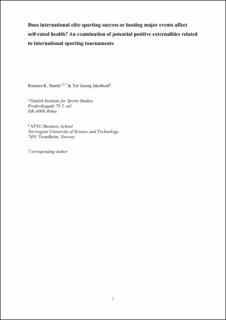Does international elite sporting success or hosting major events affect self-rated health? An examination of potential positive externalities related to international sporting tournaments
Peer reviewed, Journal article
Accepted version

View/
Date
2021Metadata
Show full item recordCollections
- NTNU Handelshøyskolen [1563]
- Publikasjoner fra CRIStin - NTNU [37186]
Original version
10.1080/23750472.2021.2004914Abstract
Research question It is a common expectation among politicians, civil servants and sport managers that hosting a major sporting event or achieving international elite sport success yields a variety of positive externalities grounded in the ‘Virtuous Cycle of Elite Sport and Events’ model. However, over the years various studies have shown that this model is not necessarily an accurate depiction of reality. This paper adds to existing research by testing whether elite sport success or hosting a major sport event can have any positive effects on citizens’ health. Research methods By employing multilevel regression models to nine rounds of the European Social Survey–consisting of individual-level data from 2002 to 2019, covering 37 countries, 219 country-survey-years, and almost 400,000 respondents–we test whether health-related impacts of elite sport success and hosting major sport events can be identified. Results and Findings The model output from our regressions does not indicate that sporting success or hosting major sport events contributes to better health. Implications The results question the ‘Virtuous Cycle of Elite Sport and Events’ model and stipulate that politicians, practitioners, and sports managers should be aware of overestimating potential positive externalities from elite sport.